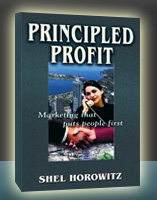Recommended Books
Recommended Books on Ethical BusinessShel Horowitz’s book, Principled Profit: Marketing That Puts People First, fits into all five of the following categories, so we’re putting it up here by itself.
A key concept of the Principled Profit philosophy is the idea that building positive relationships with ethical competitors will grow your own business. In the book, I put that into practice by listing 20 other copywriters, with full contact information and areas of specialization. I also list many competing books. Those books are listed below, along with many others I’ve discovered since I went to press. I review one “competing” book each month in my Positive Power of Principled Profit newsletter, too. Feel free to visit the archives.
Understanding Business Ethics Issues Understanding Business Ethics Issues
Full Steam Ahead! Unleash the Power of vision in Your Company and Your Life by Ken Blanchard and Jesse Stoner (Berrett-Koehler Publishers, ISBN 1-57675-244-5)Blanchard’s latest shows how a strong vision based in values can turn your company from good to great.
Levine, Stewart. The Book of Agreement (San Francisco: Berrett-Koehler, 2002). If this book didn’t already exist, I’d want it as the next book in this series. Levine, a lawyer, writes in his preface that 15 years ago, he “shifted my perspective from an adversarial orientation of ‘How can I win by protecting my client more than you protect your client?’ to the idea of ‘How can everyone get the results they desire from this collaboration?’” Very much in harmony with the ideas in these pages.
Fox, Loren. Enron: The Rise and Fall (New York: John Wiley, 2003). What happens when the world catches up to crooked companies.
Harder, David. The Truth About Work: Making a Life and a Living (Deerfield Beach, Fla.: Health Communications, Inc., 1997). Interviews with famous and unknown people who have passion for their work. Talks about issues such as support, cooperation, quality, loyalty, and more.
Brandenburger, Adam M., and Barry J. Nalebuff. Co-opetition (New York: Currency Doubleday, 1996). An early book on building alliances with competing and complementary businesses.
Burg, Bob. Winning Without Intimidationhttps://hop.clickbank.net/?frugalmar.bb0184. Bob has been one of the people who has helped me to see the wisdom of Marketing That Puts People First. In every issue of his free newsletter, you’ll see how his low-key, non-confrontational approach leads to increased sales and a happier life. The above link will take you to the purchase page for an e-book that assembles much of his wisdom. You’ll also want to subscribe to his weekly newsletter, for free, which you can do at https://www.burg.com.
Perfecting Corporate Character: Insightful Lessons for 21st Century Organizations, by Frank J. Sherosky (Strategic Publications, Inc., 1997). Sherosky argues that corporations, like people, have a character and a soul and a set of values–and that molding toward humanistic values and away form those driven by greed is a central mandate for our time. Written well before the 2002-03 round of business scandals, it seems eerily prescient, if a bit dated in places.
Best Practices For Ethical Business
Blanchard, Ken, and Sheldon Bowles. Raving Fans (New York: William Morrow, 1993). Lessons about turning customers into evangelists, told, in the Blanchard tradition, in parable form.
Everett, Melissa. Making a Living While Making a Difference: The Expanded Guide to Creating Careers with a Conscience (Gabriola Island, British Columbia: New Society Publishers, 1999). How activists can find careers (or start businesses) that fit in well with their values and beliefs.
Werth, Jacques, and Nicholas E. Ruben. High Probability Selling (Newtown, Pa.: Abba Publishing, 1996). Goes into far more depth than I can here about the selling model of doing business with those who want, need, and can afford your product.
Wreden, Nick. Fusion Branding: How to Forge Your Brand for the Future (Atlanta: Accountability Press, 2002). Shows how brands, in the post-mass-market economy, need to be about a great deal more than awareness. Urges companies to develop “a long-term profitable bond between an offering and the purchaser. This relationship is based on trust and loyalty, backed by everyday operational excellence and measured by customer equity.”
Walters, Jamie S. Big Vision, Small Business: $ Keys to Success Without Growing Big: Do Well, Do Good, Stay Small (San Francisco: Berrett-Koehler, 2002). A refreshing antidote to the idea that businesses have to become huge in order to make it. Extensive discussion of the need to build genuine relationships in business.
Tannen, Deborah. The Argument Culture: Moving from Debate to Dialogue (New York: Random House, 1998). The well-known gender communication expert looks at how to listen to each other and talk so as to be heard.
Ethical Marketing, Step by Step
Horowitz, Shel. Grassroots Marketing: Getting Noticed in a Noisy World (White River Junction, Vt.: Chelsea Green, 2000). 306 pages, large-format paperback. Available directly from the author at https://www.frugalmarketing.com 413-586-2388.
Evoy, Ken. Make Your Site Sell. Ken Evoy always jams a tremendous amount of information into all his e-books. This one is actually a series of e-books totaling about 2000 pages, covering how to develop a website that focuses on what the customer needs, and then turns that focus into sales. He has several other useful e-books, and tons of free information, as well.
Success Stories
Freiberg, Kevin, and Jackie Freiberg. Nuts! Southwest Airlines’ Crazy Recipe for Business and Personal Success (New York: Broadway Books, 1998). Inside story of a company that “gets it.”
Waugh, Barbara. The Soul in the Computer: The Story of a Corporate Revolutionary (Makawa, Hawaii: Inner Ocean Publishing, 2001). Her memoir of the incredible changes she sparked within Hewlett-Packard.
Roddick, Anita. Business As Unusual: The Journey of Anita Roddick and The Body Shop (London: Thorsons/Harper Collins, 2000). The founder of a hugely successful socially conscious business tells her story.
Wallace, Aubrey. Green Means (San Francisco: KQED Books, 1994). Profiles of environmental activists making a difference, many of whom are also making a living at it.
Lundin, Dr. Stephen, Harry Paul, and John Christensen. Fish! A Remarkable Way to Boost Morale and Improve Results (New York: Hyperion, 2000). How empowered employees, real customer relationships, and a great sense of humor turned an ordinary fish market into a magical place to work.
Lundin, Dr. Stephen, Harry Paul, and John Christensen, with Philip Stroud. Fish! Tales: Bite-sized Stories, Unlimited Possibilities (New York: Hyperion, 2002). Applying the Fish! principles to other businesses.
How To Protect Yourself Against Unethical Behavior Of Others
Norman, Al. Slam-Dunking Wal-Mart (Atlantic City: Raphel Marketing, 1999). How to block predatory megastores.
Prashad, Vijay. Fat Cats and Running Dogs: The Enron Stage of Capitalism (Monroe, Maine: Common Courage Press, 2002). A harsh look at some of the corporate scandals that have rocked the business world.
Quinn, Bill. How Wal-Mart Is Destroying America (and the World) and What You Can Do about It (Berkeley: 10 Speed Press, 2000). Another book on the retail giant’s predatory practices against not only other retailers but consumers.
Taylor, Don, and Jeanne Smalling Archer. Up Against the Wal-Marts: How Your Business Can Prosper in the Shadow of the Retail Giants (New York: Amacom, 1994). How to thrive when a predator opens next door.
Sustainable Business
Hawken, Paul, Amory Lovins, and L. Hunter Lovins. Natural Capitalism: Creating the Next Industrial Revolution (New York: Little, Brown, 2002). Includes the Curitiba story and much more.
Holliday, Charles O., Stephan Schmidheiny, and Philip Watts. Walking the Talk: The Business Case for Sustainable Development (San Francisco: World Business Council for Sustainable Development/Berrett-Koehler, 2002). The chairmen of Dupont, Anova Holding AG, and Royal Dutch Shell’s board of directors explain why sustainability is good for big business. Somewhat technical, but a perspective you don’t often see.
Kelly, Marjorie. The Divine Right of Capital (San Francisco: Berrett-Koehler, 2001). A compelling argument that capital, which doesn’t have much to do with investing directly into corporations, is inappropriately driving the economy; corporations need to answer to their employees, and not to their shareholders (who, in general, purchase previously owned shares from other stockholders, rather than directly investing in the company. By the editor of Business Ethics magazine.
True to Our Roots by Paul Dolan. Through this book, I became aware of Fetzer’s attempt to reengineer the entire American wine industry along sustainable principles.
Customer and Competitor Relationships
Hug Your Customers by Jack Mitchell. A business owner who’ll do anything for his customers–even fly across the world to deliver a suit! He turns clothing shopping from commodity to magical experience–and he is very well-compensated. I read this all the way through in about two sittings.
Sanders, Tim. Love Is the Killer App: How to Win Business and Influence Friends (New York: Crown Business/Random House, 2002). A high-level Yahoo exec discusses compassion, abundance, and love as a business success tool. Young and hip, and very in tune with my views.
|


 Shel specializes in affordable, ethical, and effective marketing for authors, publishers, small businesses, nonprofits, and community groups. Copywriter, marketing and publishing consultant, international speaker, and award-winning author of seven books.
Shel specializes in affordable, ethical, and effective marketing for authors, publishers, small businesses, nonprofits, and community groups. Copywriter, marketing and publishing consultant, international speaker, and award-winning author of seven books.